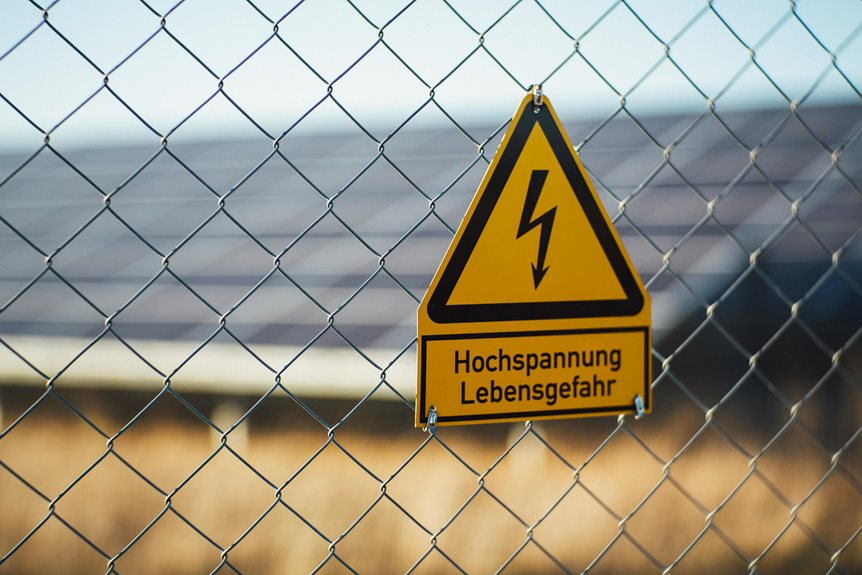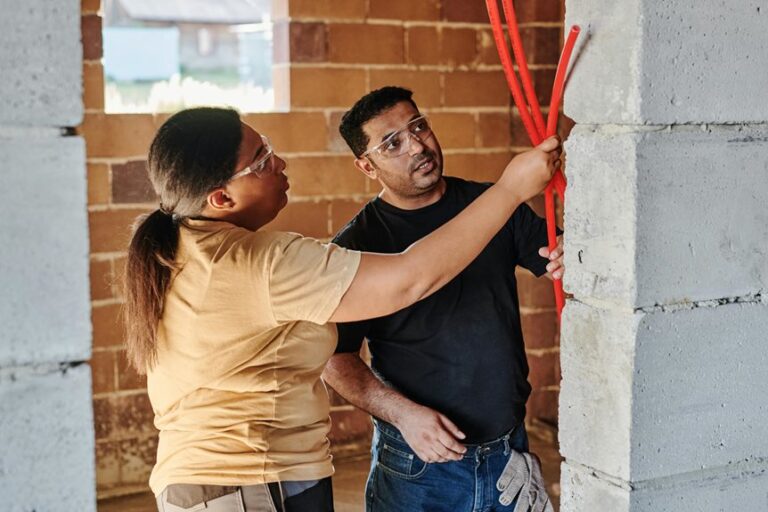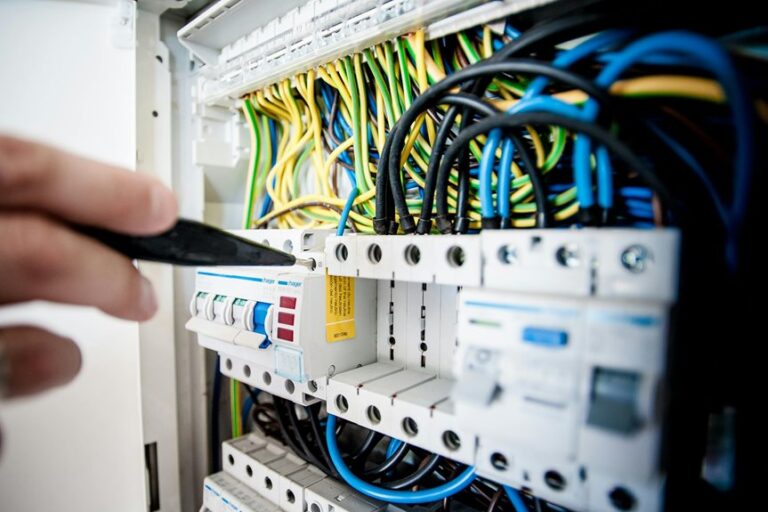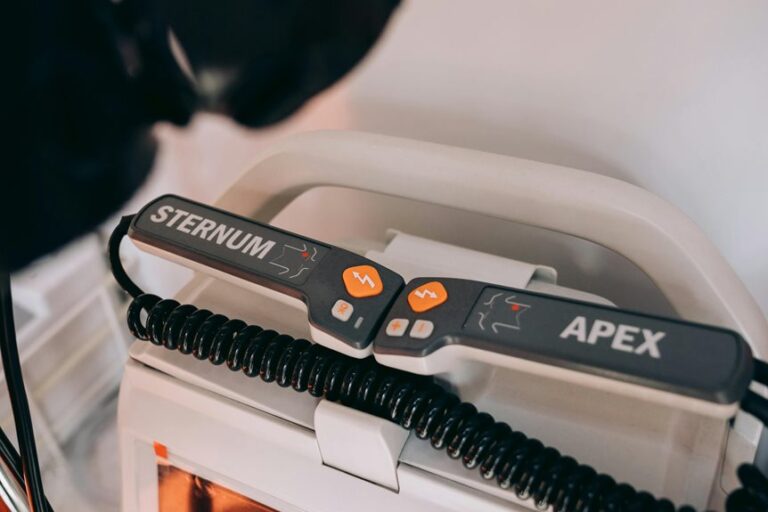Just as a well-oiled machine relies on precise components to function safely, your home's electrical system demands meticulous attention to prevent hazards. You need to recognize the importance of routine inspections, proper grounding, and the installation of circuit breakers to safeguard against overloads. But what happens when negligence creeps in or security measures fall short? Addressing this intersection of safety and security can greatly enhance your living environment and reduce risks. Understanding the nuances of electrical safety could be the key to protecting not just your property, but also those who inhabit it.
Understanding Electrical Hazards
Electrical hazards are often lurking in everyday environments, making awareness essential for safety. You mightn't realize it, but common items like frayed cords, overloaded outlets, or wet surfaces can pose considerable risks. Understanding these hazards is essential to prevent accidents or injuries.
One primary hazard is electrical shock, which occurs when the body becomes part of an electric circuit. This can happen if you touch a live wire or faulty appliance. Symptoms can range from mild tingling to severe burns or even death, depending on the voltage and current flow. Always check that your hands are dry and avoid using electrical devices in wet areas.
Another concern is electrical fires, often caused by overheating wires or faulty equipment. If you notice a burning smell or see discolored outlets, it's critical to disconnect the device immediately and call a professional. Regularly inspecting your electrical systems and appliances can help you identify potential issues before they escalate. Additionally, hiring top electricians can ensure your home's electrical systems are up to code and safe.
Lastly, remember that children and pets are particularly vulnerable. Use safety covers on outlets and educate your family about the dangers of electricity.
Importance of Proper Wiring
Guaranteeing proper wiring is essential for maintaining a safe and efficient electrical system in your home or workplace. Faulty wiring can lead to numerous hazards, including electrical fires, equipment damage, and even personal injury. By adhering to established electrical codes and standards, you can minimize these risks considerably.
Using the correct wire gauge is critical, as it determines the amount of current that can safely pass through without overheating. Overloading circuits can cause insulation to melt, creating a fire hazard.
Furthermore, guaranteeing that connections are secure and free from corrosion will enhance the reliability of your system.
Proper wiring also involves using the right materials, such as insulated wires and quality connectors. This not only guarantees safety but also improves the longevity of your electrical system. Expert electricians in Rancho Cucamonga can provide valuable assistance in ensuring your wiring meets safety standards.
Regular inspections can help identify potential issues before they escalate into serious problems.
Grounding and Bonding Fundamentals
Understanding grounding and bonding is essential for ensuring electrical safety in any installation.
You'll learn about the importance of proper grounding, various bonding techniques, and common mistakes that can compromise safety.
Importance of Grounding
Grounding plays an essential role in electrical safety, as it provides a pathway for excess current to dissipate safely into the ground. When electrical faults occur, such as short circuits or equipment malfunctions, grounding helps prevent dangerous voltage levels from affecting people or equipment.
By directing excess current away from sensitive components and individuals, grounding considerably reduces the risk of electric shock and fire hazards.
You should verify that grounding systems are properly designed and installed according to relevant codes and standards. This includes using appropriate grounding electrodes, such as ground rods or plates, and verifying they're connected with suitable conductors.
Regular inspections and maintenance of grounding systems are vital to confirm their effectiveness over time.
In addition to safety, grounding also helps in maintaining the integrity of electrical systems. It minimizes voltage fluctuations and electromagnetic interference, which can disrupt the operation of sensitive devices.
Bonding Techniques Explained
While grounding establishes a safe path for excess current, bonding techniques play an essential role in enhancing overall electrical safety by connecting various conductive parts together.
By guaranteeing that all metallic surfaces and conductive systems are at the same electrical potential, you reduce the risk of electric shock and equipment damage.
Here are key bonding techniques you should consider:
- Direct Bonding: Connect two conductive parts directly using a bonding conductor to guarantee a low-resistance path.
- Common Bonding: Use a single bonding point to connect multiple equipment grounds, simplifying the system and reducing the chances of potential differences.
- Equipotential Bonding: This technique involves bonding all large conductive parts within a space to a common ground, minimizing shock hazards.
- Bonding Jumpers: These are temporary or permanent connections that help maintain electrical continuity, especially during maintenance or repairs.
Implementing proper bonding techniques not only meets electrical code requirements but also enhances safety.
Always guarantee that your bonding methods are compliant with local regulations and industry standards to maintain a secure electrical system.
Common Grounding Mistakes
What common grounding mistakes can undermine your electrical safety? Grounding is essential for protecting both equipment and personnel, yet several frequent errors occur. Understanding these pitfalls can help you enhance safety in your electrical installations.
| Mistake | Consequence | Prevention |
|---|---|---|
| Inadequate grounding system | Increased risk of electrical shock | Guarantee proper ground rod depth |
| Using improper materials | Corrosion and system failures | Use corrosion-resistant conductors |
| Poor connections | Voltage fluctuations and equipment damage | Regularly inspect connections |
| Neglecting bonding | Equipment damage and fire hazards | Bond all conductive surfaces |
Common Electrical Safety Practices
To guarantee electrical safety, you need to implement regular inspections and maintenance of your equipment.
Proper use of electrical tools is essential in preventing accidents and guaranteeing longevity.
Additionally, having an emergency preparedness plan in place can greatly reduce risks in case of an electrical failure. Hiring qualified electricians in Riverside can also ensure that all installations and repairs are up to code.
Regular Inspections and Maintenance
Regular inspections and maintenance are essential for guaranteeing electrical safety in both residential and commercial settings.
Neglecting these practices can lead to hazardous situations, such as electrical fires or equipment failure. By scheduling regular assessments, you can identify potential issues before they escalate.
Here are some key practices to incorporate into your regular maintenance routine:
- Inspect Wiring: Look for frayed or damaged wires that could lead to shorts.
- Test Ground Fault Circuit Interrupters (GFCIs): Make sure they function properly to prevent electrical shocks.
- Check Breaker Panels: Verify all breakers are properly labeled and functioning, and check for any signs of overheating.
- Examine Outlets and Switches: Look for discoloration or heat, which might indicate underlying problems.
Proper Use of Equipment
Properly using electrical equipment is essential for guaranteeing safety and preventing accidents. Always read the manufacturer's instructions before operating any device. Familiarize yourself with the equipment's specifications, including voltage and current ratings, to avoid overloading circuits. Ascertain that you're using the right tool for the job; using equipment outside its intended purpose can lead to failures or hazards.
When handling electrical devices, wear appropriate personal protective equipment (PPE), such as insulated gloves and safety goggles. Inspect cords and plugs for damage before each use, and never use damaged equipment. Keep work areas dry and free from clutter to minimize tripping hazards and reduce the risk of electrical shock.
For tools that require grounding, always verify they're connected to a properly grounded outlet. Use surge protectors with sensitive electronic devices to guard against power spikes. If you need to use extension cords, choose ones rated for the equipment's load and avoid daisy-chaining multiple cords.
Finally, never attempt to repair electrical equipment unless you're qualified. If you encounter a problem, consult a licensed electrician to ensure safe and proper handling. Following these practices will help you maintain a safe working environment.
Emergency Preparedness Plans
When working with electrical equipment, having an emergency preparedness plan is essential for guaranteeing safety during unexpected situations.
Being proactive can minimize risks and protect you and others from potential hazards. Here are some key elements to include in your plan:
- Identify Emergency Contacts: Know who to call in case of an electrical emergency, including local emergency services and your facility's safety officer.
- Establish Safety Zones: Designate areas where personnel should gather during an emergency, away from any electrical hazards.
- Conduct Regular Drills: Practice your emergency procedures regularly to guarantee everyone knows what to do and can act quickly if a situation arises.
- Maintain Emergency Equipment: Guarantee that fire extinguishers, first aid kits, and other emergency tools are easily accessible and in good working condition.
Preventing Electrical Fires
Electrical fires can ignite swiftly and unexpectedly, making it vital to implement effective preventive measures. Start by confirming your electrical system is up to code. Regularly inspect wires, outlets, and appliances for signs of wear or damage. If you notice fraying cords or scorch marks around outlets, replace or repair them immediately.
Use high-quality, certified appliances and avoid overloading circuits. Each outlet should have a designated load, so check the amperage before plugging in multiple devices. Consider using power strips with built-in circuit breakers to protect against overloads.
Additionally, verify that you keep flammable materials away from electrical sources. Store items like paper, cloth, and chemicals at a safe distance from appliances and outlets.
It's also wise to install smoke alarms on every floor and check their functionality monthly. Replace batteries at least once a year, and consider hardwired alarms for added safety.
Finally, make sure everyone in your home knows how to respond in case of an electrical fire. Having a fire extinguisher nearby, specifically rated for electrical fires, is essential. Furthermore, hiring reliable electricians can help ensure that your electrical system is safely maintained and meets necessary standards.
Security Measures Against Theft
While securing your home against theft may seem intimidating, implementing a few key measures can considerably enhance your safety.
One of the most effective ways to deter potential intruders is through proper lighting and surveillance. Consider investing in motion-activated lights and security cameras to keep your property monitored.
Additionally, securing your electrical systems can also play an important role in theft prevention. Expert electricians can help ensure that your electrical systems are both safe and secure.
Here are some essential security measures you should take:
- Install deadbolts on all exterior doors for added protection.
- Utilize security systems that include alarms and remote monitoring capabilities.
- Keep windows locked and consider reinforcing them with security film or window bars.
- Join a neighborhood watch program to foster community vigilance.
Identifying Electrical Tampering
Identifying Electrical Tampering
Securing your home against theft involves more than just physical barriers; it also includes protecting your electrical systems from tampering. Identifying electrical tampering is essential for maintaining safety and security.
Start by inspecting your electrical panels and outlets regularly. Look for signs of forced entry, such as scratched paint or damaged screws. If you notice wires that appear frayed or disconnected, it's a strong indication of tampering.
Additionally, keep an eye on your circuit breakers. Frequent tripping may suggest unauthorized alterations to your electrical system. Use a voltage meter to check for unusual fluctuations in power. If you detect inconsistencies, it could signal tampering or faulty wiring.
Be vigilant about unusual sounds, like buzzing or humming from outlets or appliances. These noises might indicate tampering or a malfunction that needs immediate attention.
Finally, consider installing security cameras to monitor critical areas, including your electrical panels. Surveillance can deter potential tampering and provide evidence if needed. Regular inspections by licensed electricians can also help ensure your electrical systems remain secure and undamaged.
Emergency Preparedness Tips
Being prepared for emergencies is essential for guaranteeing the safety of your home and loved ones. Electrical emergencies can occur suddenly, so having a plan in place can make all the difference. Here are some key tips to help you prepare:
- Know your circuit breakers: Familiarize yourself with your electrical panel and labeled circuits. This will enable you to quickly shut off power if needed.
- Create an emergency kit: Assemble a kit that includes flashlights, batteries, a first-aid kit, and essential medications. This guarantees you have the necessary supplies during a power outage.
- Develop a communication plan: Make sure everyone in your household knows how to reach each other in case of an emergency. Designate a meeting spot outside your home.
- Stay informed: Regularly check local news and weather updates for potential electrical hazards, such as severe storms that may lead to power outages or downed lines.
- Consider consulting with electricians in Fontana for additional safety measures and electrical inspections that can prevent emergencies before they occur.
Resources for Electrical Safety
After preparing for emergencies, it's important to utilize available resources that enhance electrical safety in your home.
Start by familiarizing yourself with the National Fire Protection Association (NFPA) guidelines, which provide essential information on electrical safety standards. Their publications, available online, detail safe wiring practices and the importance of regular inspections.
Next, consider investing in surge protectors to shield your electronics from voltage spikes. Look for models that meet Underwriters Laboratories (UL) standards for ideal protection.
Additionally, your local utility company may offer resources like free safety inspections or educational materials about safe electrical practices.
Don't overlook the significance of circuit breakers; they're vital for preventing overloads. Confirm your home has adequate circuit breakers installed, and familiarize yourself with their locations and functions.
Finally, utilize online platforms like the Electrical Safety Foundation International (ESFI) for up-to-date safety tips and educational resources. It's also beneficial to connect with local electricians in Chino who can provide expert advice on maintaining electrical safety in your home.
Conclusion
To conclude, prioritizing electrical safety and security is like fortifying your home against stormy weather. By understanding hazards, ensuring proper wiring, and implementing security measures, you create a safer living environment. Regular inspections and community engagement further enhance your vigilance. Remember, being proactive today can prevent accidents and theft tomorrow. Equip yourself with knowledge and resources, and take the necessary steps to protect both your home and loved ones from potential dangers. Your safety is worth the effort.








